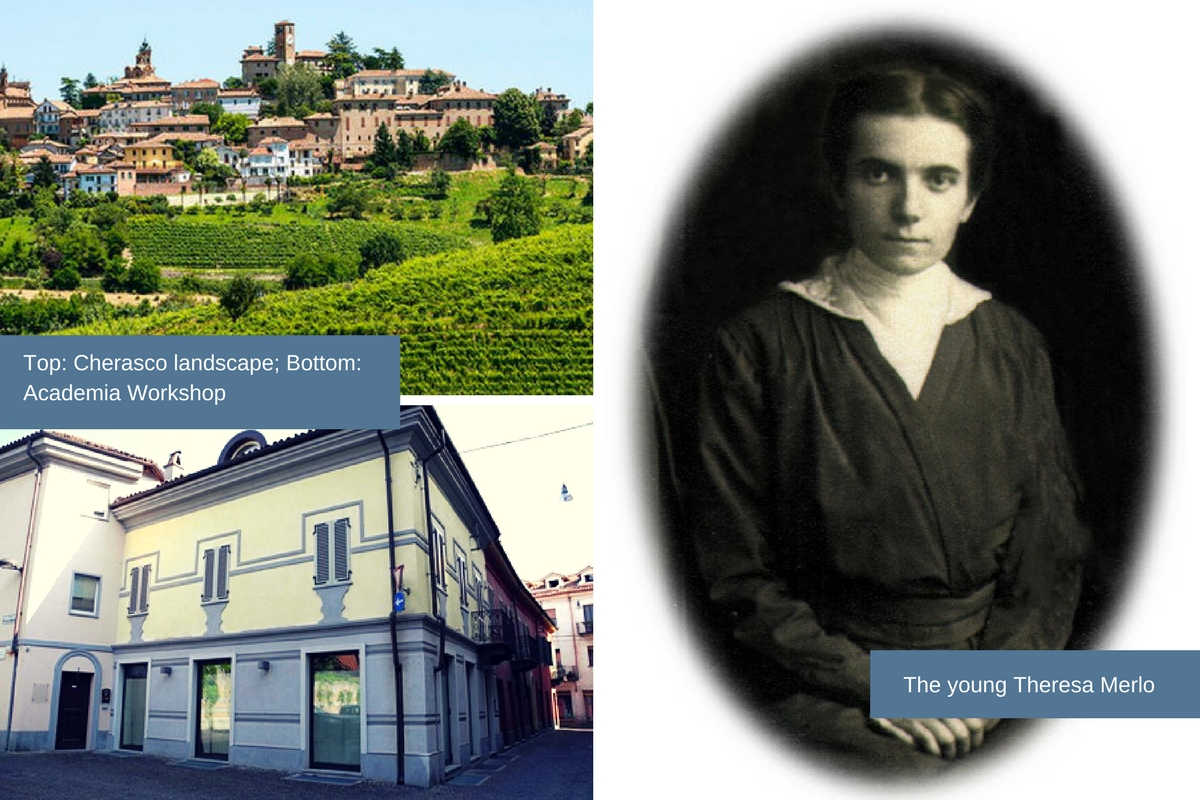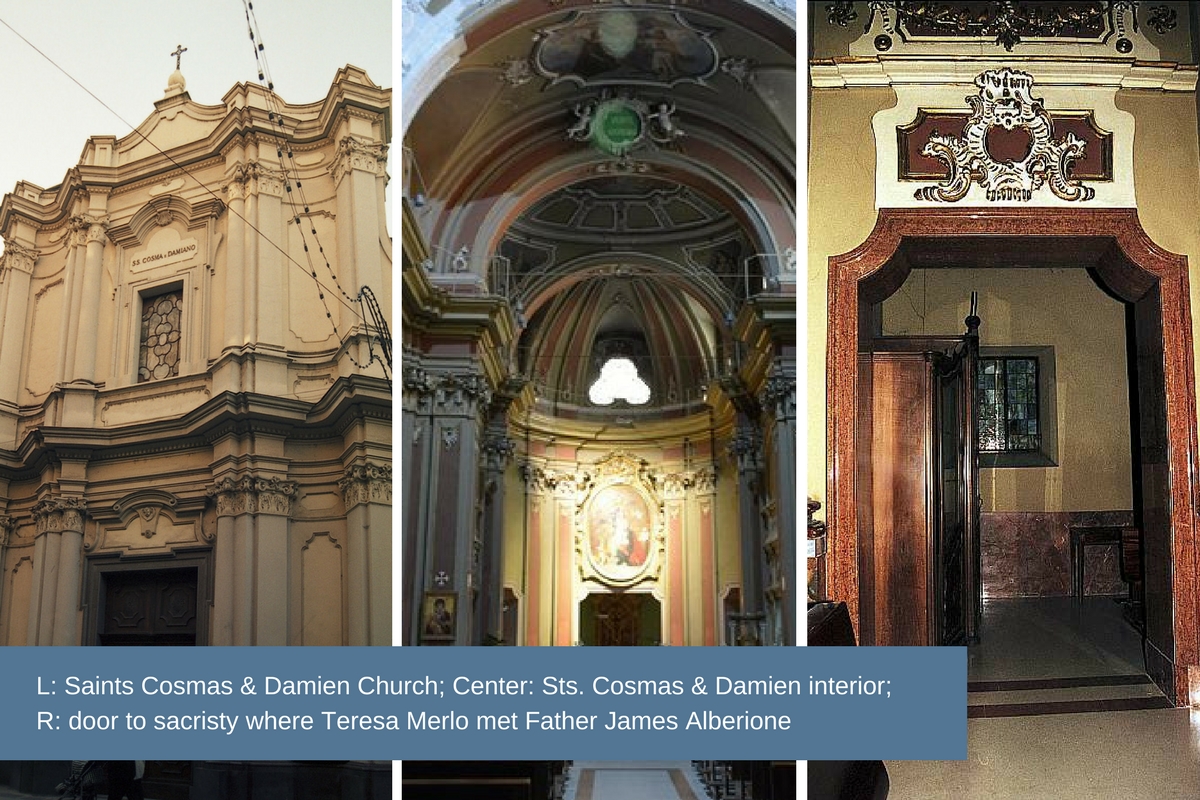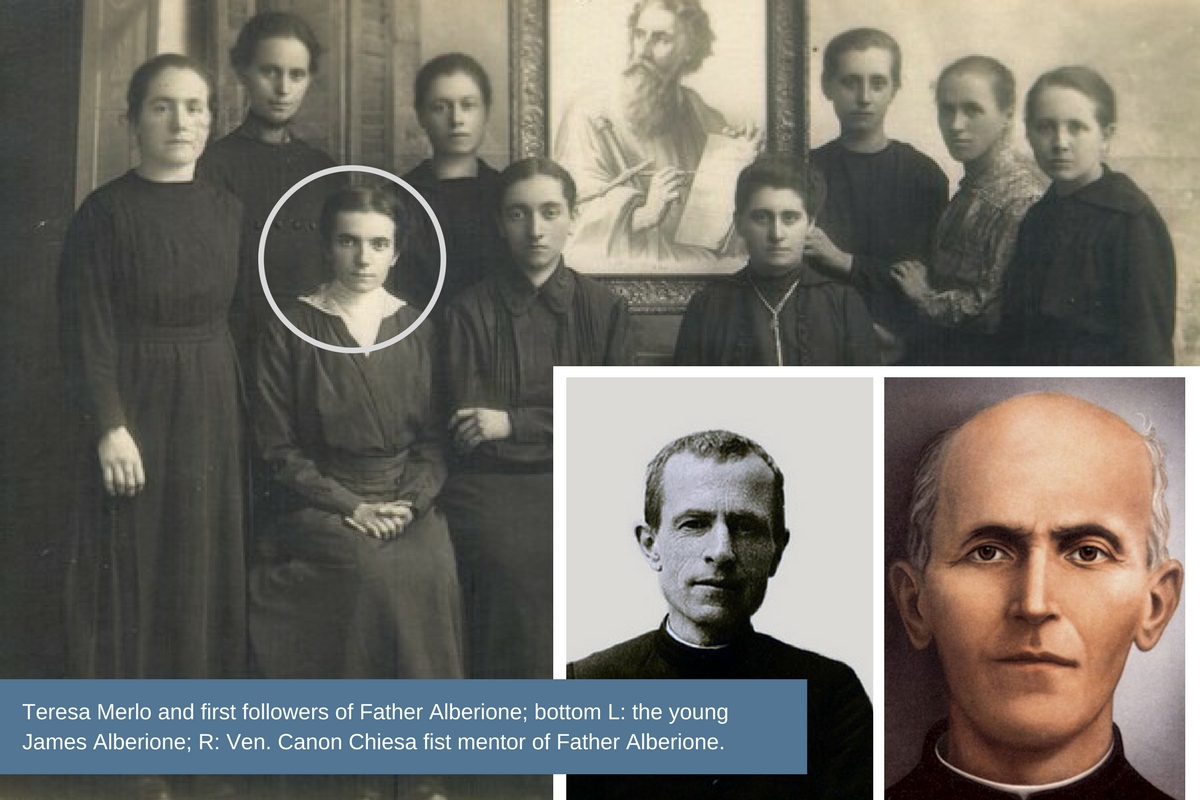The priest, Father James Alberione, who had already founded the Society of St. Paul for priests and brothers a year earlier had a vision for what women could do in the Church.
On June 15, 1915, Father Alberione opened the Feminine Workshop in Piazza Cherasca. What had previously been a print shop for the younger members of the Society of St. Paul, now became a place where young women would be temporarily be sewing clothing for the members of the army. ( It was wartime)
Not long after James Alberione wanted to meet Teresa Merlo, the sister of Costanzo Leone, a student at the seminary where Alberione taught theology, for he heard from him of her good reputation as a catechist.
A date was set. Both Teresa and her mother Vincenza Merlo were to meet him at the Church of Saints Cosmos and Damian on the 27th of June almost two weeks after the workshop had been opened.

Both Teresa and her mother met separately with Father. Father Alberione explained to Teresa that he opened up a sewing shop and that there were already three women working in it. They have a contract for sewing uniforms for the military. It’s a temporary job, which will be replaced by a print shop where we would produce religious books and magazines. I want to begin a congregation of sisters who will write, print and distribute books about our Catholic faith. She wanted to become a sister. Would this, now, be her chance to be accepted into religious life? In the past she had not been admitted to other congregations because of her frail health. After the meeting Teresa She explained to her mother what Alberione was asking of her. The 22 year old Teresa said how the priest shared with her his vision of beginning a sewing workshop that would eventually become a printing shop. It would be totally dedicated to the good press like the one at the seminary of the Society of St. Paul which was already in progress at another location.
What did you answer, her mother asked her? Teresa replied: “I said yes.” Teresa never took back that “yes.” Her heart was full of the love of God and this “yes” was the hallmark of the rest of her life.
Teresa Merlo, (who later would be given the name Thecla for her profession name), wrote of those first days of the congregation, “We were occupying the place which the young printers had vacated, and we could not help saying to one another: ‘Who knows when we will be able to do the work they are now doing?’ But our speculations never went further than that. In the morning we went to Mass at Saint Damian’s. Afterwards Canon [Francis] Chiesa would preach a meditation for us (at that time our group numbered four). He did this for some time.”

The spirit of Teresa and her companions became ever more strengthened by the meditations on the Word of God and in the devotion to Saint Paul. The servant of God, Canon Chiesa and Father Alberione followed them intensely and promoted their spiritual and intellectual progress with meditations, conferences and school.
Teresa recorded these words, “The Theologian ‘lovingly broke the bread for us’ to nourish our infant souls and weak wills. How sweetly those truths, advices, and words, spoken so sincerely, descended into our hearts. …Meanwhile, our work for the soldiers had ceased. But we continued the workshop and accepted young women who came to learn sewing.”
Three of the young women were Teresa, Angela and Clelia. They had already told Father James Alberione that they hoped to become religious sisters. The rest were teenagers, who came to learn how to sew.
But now, the sewing shop had a second purpose. It was helping the trade school bring over stacks of folded sheets of paper that had already been printed and needed to be sewn together in sets as the next step in bookbinding. Teresa would remind the sewing group, “We’re doing the Lord’s work. We’re helping to make books that will teach many people about God.”
In fact, fifty years later, when James Alberione reflected on that first pivotal meeting with Teresa Merlo, he later wrote “When I invited her to begin the small Institute for young women, I told her: “Do it for the love of God!” That was enough to persuade her, no other motives. Thus she began and thus she continued up to her death. …For fifty years I was in communication with Prima Maestra Thecla (which means “First Teacher”). She never failed to act upon my decisions, no matter how many sacrifices were involved.”
Saying YES to God’s plan for our life is never easy. The young Teresa Merlo found the strength for her continual and faithful YES in prayer. This precious prayer she prayed and wrote in the early days of the congregation:
“Beginning right now, I unite my prayers and sufferings to the intentions of Jesus in the holy Host, and I want to renew this offering with every beat of my heart. At night, may every breath I take while asleep be an act of continual communion with you, my God. With every breath I take, I want to say: Jesus is with us and we are with Jesus.
… I ask for the love the Theologian expects of us and that you expect of us, my God. Most Holy Trinity, Mary most holy, Saint Paul, my guardian angel, my patron saints, bless my resolutions and help me remain faithful to God until death.
Thanks be to God. May your will be done.” (Teresa Merlo January 1, 1927)
